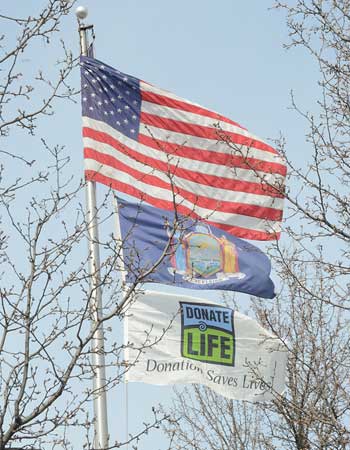Blog
 Every 13 hours, someone dies waiting for an organ transplant in our state. Here at Saratoga Hospital, the number of patients needing a transplant has steadily increased every year. More people are chronically ill and living longer with organ failure such as renal, liver, and heart disease.
Every 13 hours, someone dies waiting for an organ transplant in our state. Here at Saratoga Hospital, the number of patients needing a transplant has steadily increased every year. More people are chronically ill and living longer with organ failure such as renal, liver, and heart disease.
Organ, eye and tissue donations offer many ways to give hope, support and strength to waiting patients, recipients and donor families. Today, right now, we ask you to consider your role in this lifesaving and healing journey by registering as a donor or considering living donation.
While we do not do any transplants here, we work in concert with the many hospitals that do. Sometimes a patient has maximized drug treatment, and the only alternative is a transplant. Other times, the need develops from a tragic accident.
Diane Bartos, DNP, RN, NEA-BC, Administrative Director of our Intensive Care Unit, recalled a fairly young adult male who had mistakenly taken too much Tylenol one weekend, making his liver inoperable. “He was not engaged in any self-destructive behavior,” she says. “It was a simple mistake, one that destroyed his liver. Out of the blue, he suddenly needed an emergency liver transplant. And someone saved his life.”
We recognize the decision to donate is complex, requiring much thought, which is why we have staff available who can answer any questions you may have. Anytime a patient is close to expiration, federal law requires health care providers to discuss organ donation with that family.
“We hold those discussions with the utmost sensitivity and compassion, and we have had a significant number of donors here,” says Bartos.
Such a conversation would occur in brain death by neurological status, which is when someone’s brain is no longer functioning and won’t sustain life off the respirator. Other times, a patient’s death is imminent, and the family will discuss donating the organs upon natural death. These donations have saved lives, given back eyesight, helped patients permanently off dialysis, and more.
“I encourage everyone reading this to strongly consider becoming an organ donor,” says Bartos. “To give an organ is to give a life. As difficult as that is to face, it is also a very hopeful, healing process for people and their families. Our deepest thanks to everyone who has registered.”
If you have questions or would like to sign up for the organ donation registry, you can do so by signing the back of your driver’s license and registering through the NYS Department of Motor Vehicles organ donation registry. Find out more about and how you can inspire others to provide hope through donor registration and living donation at DonateLife.net.

